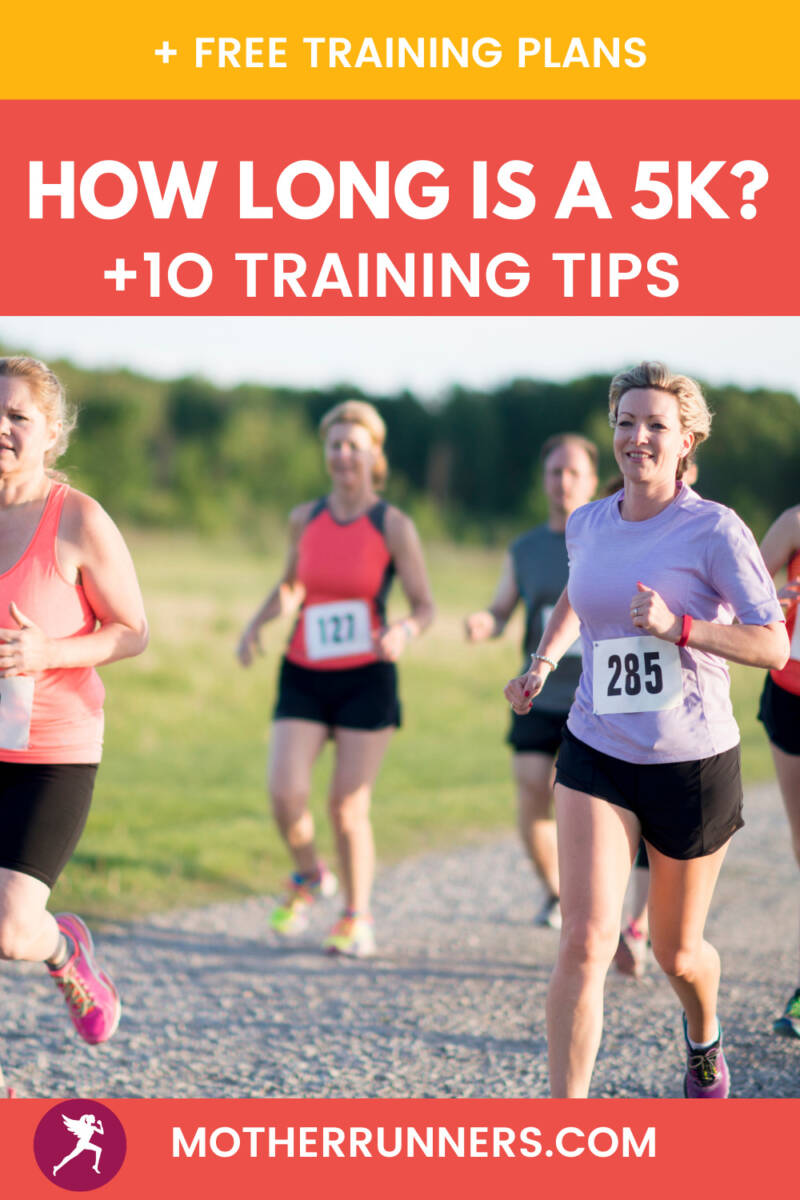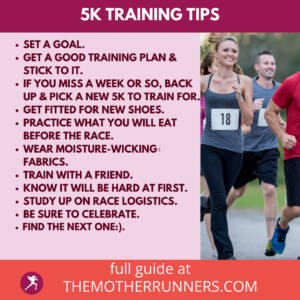A 5k is 3.1 miles or just over 12 laps on a 400 meter track. It is a popular distance for a reason–it is manageable for most people. The 5k often serves as a gateway for people into the world of running!
Unless you are a runner, chances are you don’t know how many miles is a 5k. For the record: a 5k is 3.1 miles. The ‘k’ in 5k stands for kilometers which is a measurement in the metric system. How many kilometers are in a mile? About 1.61 kilometers make a mile which is why a 5k is 3.1 miles. (In the United States, we use the Imperial System and measure things by miles).
I liken people not knowing how long a 5k is in miles to me not knowing swimming distances—I have no clue how long it takes to swim a mile or how many lengths in the pool that requires, for example.
Download my free 5k training plan!

Related: How to Start Running: A Complete Beginner’s Guide
This is what I remind myself when I start to get annoyed by people asking me how my “marathon” went when I only ran a 5k…or when people ask me how long my 5k is or how long my marathon is. The distances do not change, people! But then I remember to give them grace—running isn’t a world everyone knows. It’s kind that they even asked, I remind myself.
Related: 24 Things NOT to Say to a Runner
A 5k is an important distance because it often serves as a gateway to becoming a runner. It’s often people’s first race when they enter a fun run or road race…Non-runners are encouraged to sign up for a 5k, they will follow a training plan (like my free one!), become amazed by what they accomplished, and strive to run faster and farther. And, voila! They become a runner!
If you are considering training for a 5k, I want to help you! In this article, I will share pertinent information for proper training for a 5k to get you to the finish line…and maybe…beyond (!).
Specifically, I will cover:
- How many miles is a 5k?
- Why run a 5k?
- Are you fit if you can run a 5k?
- How do you train for a 5k?
- What’s a good Couch to 5k training plan?
- How many minutes should a 5k take? + average 5k times
- What gear do I need to run a 5k?
- 10 tips for running your first 5k
Let’s go!
How long is a 5k in miles?
So just how far is a 5k? A 5k is 3.107 miles. 5k is short for 5 kilometers. The 5k distance, also known as 5,000 meters, is about 12.5 laps around a 400-meter track (4 laps around a track is a mile and .1 is almost half a lap or 200 meters). The ‘k” stands for kilometer. About 1.609 kilometers equals a mile.
The 10k distance is 6.2 miles. A 15k is 9.3 miles. Many popular race distances are 5k multiplied which means you multiply 3.1 miles. For example, a 20k distance is 12.4 miles (or 4 by 3.1 miles).

Aren’t I a mathmagician?
What’s an average time for running a 5k?
Your 5k finish time will depend on a variety of factors such as fitness level, running experience, current training, nutrition, age, gender, and more.
That said, the average 5k time for a man is 22:31 and the average 5k running time for a woman is 26:07.
Why should you run a 5k?
Running a 5k can be life-changing for many reasons. The majority of people in the world are capable of running a 5k regardless of fitness level. A 5k is the right amount of challenge to kickstart a healthy lifestyle and self-belief. These are ingredients for a runner in the making.
Related: How Running Makes You Happy
Below are seven benefits of running a 5k (note there are many more reasons to run the 5k distance!):
1. Most anyone can run a 5k.
The 5k distance is long enough for it to feel challenging but not daunting. Most anyone can train to run 3.1 miles if they have a will and a way.
2. Running a 5k kickstarts a healthy lifestyle.
When you start running, you will notice that you will start changing the way you live for you to feel better on your runs. You will start going to bed earlier, making better food choices, and overall being mindful of how your choices affect how your body feels.
3. You will experience many health benefits and may lose weight.
Running has too many health benefits to count from a healthier heart, reduced stress, stronger bones, lower body mass, and even less anxiety and depression.
4. It’s convenient to train for the 5k distance.
Training for a 5k isn’t very time-consuming—it just takes a few hours a week in total. It is also easy to find a 5k race to train for and the only equipment you really need is a good pair of shoes.
5. A 5k sparks a running lifestyle.
As I said, a 5k is often the distance that gets people into running. So many runners, including pro runner Keira D’Amato who set the American marathon record, get into running after doing a 5k. When you choose to running as a lifelong habit, you choose a healthy life with many positive changes to both your physical health and mental health.
6. You meet friends running a 5k.
The running community is robust and supportive. Don’t be surprised if you make new friends and chat alongside fellow runners during your first 5k. Running is a surefire way to make fast friends.
7. Training for a 5k grows your self-confidence.
There’s a reason why programs like Girls on the Run, a nonprofit organization that empowers young girls to train for a 5k, exist. Running is a powerful vehicle for instilling self-belief and improving self-esteem in people. When you realize you can do anything you put your mind to, you become unstoppable.
Related: How to Safely Lose Weight by Running
Indeed, many people run a 5k and then do it again and again throughout their running journey. For beginner runners it’s a great distance because it is an achievable goal. For advanced runners or fast runners, it’s a popular distance because you can try to cover it in a certain time or at a certain pace.

Are you fit if you can run a 5k?
If you can run a 5k without stopping, you are fit! Running 3.1 miles is a long way (try driving it and you will see!). Therefore, if you can run 3.1 miles, you are fit and should be proud of yourself.
You should also start considering doing another one—faster…see, that’s how running gets you! You compete with yourself to be your best self!
How do you train to run a 5k?
There is a multitude of free 5k training programs online, including many Couch to 5k training programs (or C25k). No need to search for a free 5k training program—just head on over to my free training programs which offers beginner runner level program, to intermediate levels. My free 5k coaching plan also offers tips for new runners and answers common questions about training for a 5k.
Related: Check out my FREE 5k Training Programs
In general, it takes about 8 weeks to train for a 5k in which you will run at minimum 3 days a week, averaging about 10 miles total per week. You will gradually run more each week, culminating with running 3.1 miles at one time.
More advanced 5k training programs will include more running days, higher weekly running volume, and speed work to increase your 5k training pace.
What’s a good Couch to 5k training plan?
A decent 5k training plan should gradually increase your running over the course of at least 8 weeks. In general, a good beginner 5k training program should include the following:
- At least 8 weeks of running ending with the 5k race (like starts with run/walk interval training)
- Alternate running days with rest or cross-training days
- Include days for cross-training and strength training, and at least 1-2 rest days
- Gradually increase your running volume by 10 percent week to week
- Grow your running volume above 10 miles per week in total
- Leave you ready to run the race and wanting more!
How many minutes should running a 5k take?
The average 5k time for a beginner female runner is 35-45 minutes with the average 5k pace for a beginner female runner being 12 to 15-minute mile.
The average 5k time for a beginner male runner is 30-40 minutes with the average beginner male runner 5k pace being about 10 to 13-minute mile.
A good time for 5k is under 20 minutes—or about a 6:30-minute pace or below. This is the time that wins races and age groups in 5ks.
What should I wear to run a 5k?
You should wear moisture-wicking fabrics when you run a 5k. Avoid wearing cotton as it will absorb moisture and become heavy. If it is cold outside, wearing cotton will make you feel colder because it will get wet.
If it’s cold outside, opt for wearing wool as it traps in heat and wicks moisture.
Related: How to Dress for Running in the Cold
You will want to wear athletic socks that prevent blisters (I like Balega, Swiftwick, and Feetures) and a good pair of running shoes. I suggest going to a running shoe store and being fitted for proper running shoes. Many people think wearing old tennis shoes will suffice for training for a 5k and running a 5k—do not make this mistake. Running in old athletic shoes will likely lead to injury!
Related: When Should You Replace Your Running Shoes?
In addition to not wearing cotton when running a 5k, you should also avoid wearing jeans, heavy sweatshirts, or khakis. I know this may seem like common sense, but I have seen everything!

10 5k Tips for Running Your First 5k
-
Set a goal.
I do not advise just jumping into your first 5k without training. Pick a solid 5k training plan like mine, and then find a 5k race to train for. Stick to the plan as best as you can. If you fall off, back up your training and find another 5k. There are plenty. Do not risk getting injured by rushing your training. Be patient with your body as it adapts to the new training stress.
Related: How to Adjust Your Training Schedule for Days off
-
Listen to your body.
It is natural to have sore muscles and even some aches and pains as you start running. Listen to your body and do not run through pain. If your pain worsens as you run, is about a 3 on a 10-point pain scale, or causes you to change your gait, take a couple of rest days. If your pain does not improve after treating it at home with ice, heat, and rest, consider seeing a physical therapist or sports doc.
Related: Injured Before Your Marathon? Here’s What to Do!
-
Expect it to be hard at first.
Running is hard, especially in the very beginning. Give your body time and it will get easier. This is a sport built on consistency. Every time you run, you spur physiological changes in your body that make running easier such as an increase in capillary density, mitochondria, bone, and muscle strength. Stick with it. It gets easier even after just a couple of weeks!
-
Train with a friend.
Training for your 5k with a friend will make the process more fun and hold you accountable. You’ll be surprised how much more you may bond with your friend during the training process. You can also form a group to train to raise money for a cause. Training for a 5k with other people will hold you accountable and more likely to run the 5k (and maybe even convert you to becoming a runner).
Related: Mobility Routine for Runners
-
Take walk breaks and run easy.
Many Couch to 5k plans such as mine will have run/walk intervals suggested. If they do, please do not be afraid to take walk breaks as your body gets used to running. These walk breaks help you stay consistent with your schedule and ease the strain on your body. It is not weak to walk. It is part of the process.
When you run, be sure you run at an easy pace in which you feel in control and can hold a conversation. I tell my athletes to go by the 3 Cs: controlled, comfortable, and conversational. This allows you to safely build running volume without getting hurt.
Related: The Benefits of an Easy Running Pace
-
Warm-up and cool-down.
Taking 5 minutes to warm up and cool down is not a waste of time. This bit of time is crucial for preventing running injuries. Taking some time to do some dynamic stretches and mobility drills will help get your blood flowing, joints lubricated, and muscles warmed to get ready to work. Also, be sure to start your runs extra slow as you warm up. I always run my first few miles much slower than my average pace.

Related: A 5-Minute Warm-up for Runners
When you are done with your run, taking some time to walk and let your heart rate slow helps relax the body. Doing some light stretching and foam rolling will work out kinks in your muscles and balance out the work you did.
Be sure to do this race day as well.
Related: Benefits of Foam Rolling for Runners
-
Get proper running shoes.
Do not wear any old pair of athletic shoes to train for your 5k. Go to a running store and have them watch you run to find the perfect shoe for your running gait. Even if you have an old pair of running shoes that don’t have a lot of miles on them, materials degrade over time. For this reason, it’s wise to get a new pair of running shoes.
Related: Hoka Rincon 3: The Best Shoe for Plantar Fasciitis
-
Study up on race logistics.
The week before your race, make sure you read all the information about packet pick-up, parking, port-a-potties, race start-time, etc. Leave yourself plenty of time (about an hour) to get to the race and get situated (including several potty stops and a warm-up).
Related: Pro Racing Strategies
-
Plan your fuel.
In most cases, you want to eat 200-300 simple carbs before running. Avoid eating anything strange the night, day, or morning before or after your race. Practice what sits well in your stomach throughout your training. Many runners like to eat a bagel, crackers, oatmeal, or a Honey Stinger waffle before a run.
Related: What Runners Should Eat
-
Have fun and celebrate.
Running a 5k is a big deal. Please be sure to leave space for being proud of yourself and celebrating your accomplishment. Think about how you might celebrate whether it is with an Instagram post, a massage, or signing up for your next one! (See, did I convince you to become a runner yet??)
Check out my run coaching services if you want guidance with your running, 5k goals, or next big goal from a certified running coach. Also, be sure to check out my free training plans:
- Postpartum Training Plan
- After a Break Training Plan
- 5k Training Plans
- 10k Training Plans
- Half Marathon Training Plans
- Marathon Training Plans
- Strength Training Plan
